FIDE statement on participation of neutral athletes from vulnerable groups in team events
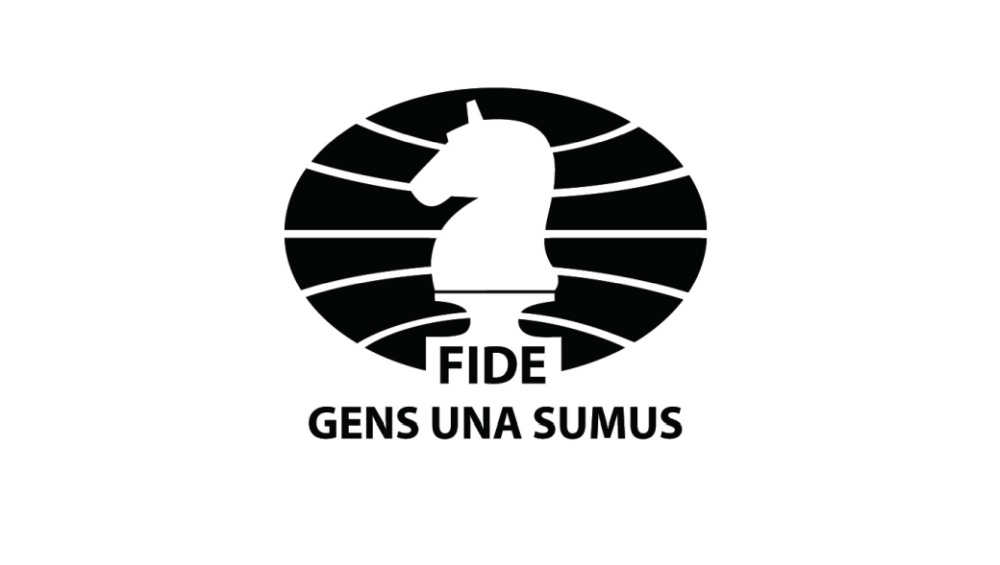
Following the FIDE 2024 General Assembly’s resolution GA 2024/20 regarding the participation of Russian and Belarusian athletes in FIDE events, we wish to provide an update on our position and the decisions made by the FIDE Council. As instructed by the General Assembly, FIDE consulted the International Olympic Committee (IOC) for guidelines about the possibility of partially reconsidering existing restrictions to allow vulnerable groups to compete in all FIDE events. The IOC responded, stating: “It is up to each International Federation to consider the appropriate implementation of the IOC Executive Board recommendations on the participation of AIN athletes in the events they govern.” Commenting specifically on the draft decision regarding neutral teams in youth and disabled events, the IOC confirmed its respect for FIDE’s actions and noted that the proposal was “not contrary to these recommendations [by the IOC].” With the above in mind and in line with FIDE’s commitment to inclusivity, fair play, and international sporting principles, the FIDE Council has decided: 1. To allow the participation of teams, consisting of neutral athletes, in the youth (under 18) competitions and events for players with disabilities. 2. To authorize the FIDE Deputy President to approve specific conditions for admission and the formation of the above-mentioned teams in each specific case. 3. To confirm that all already existing limitations regarding national symbols of the neutral athletes in the individual events will apply to the teams consisting of the neutral athletes. The conditions for participation have been carefully designed to align fully with IOC recommendations and uphold fairness and integrity. This decision applies exclusively to team events, in the specified categories. Reflecting on the decision, FIDE Deputy President Viswanathan Anand said: “This decision echoes FIDE’s commitment to balancing inclusivity with responsibility. We discussed this carefully, checked with the IOC, received their clear guidance and support, and ensured our approach respects both humanitarian considerations and the principles of international sport.” FIDE reaffirms its commitment to transparency and open dialogue. We are dedicated to supporting players, regardless of nationality, while ensuring chess continues to thrive as a global sport that unites rather than divides.
London to host FIDE World Rapid and Blitz Team Championships 2025
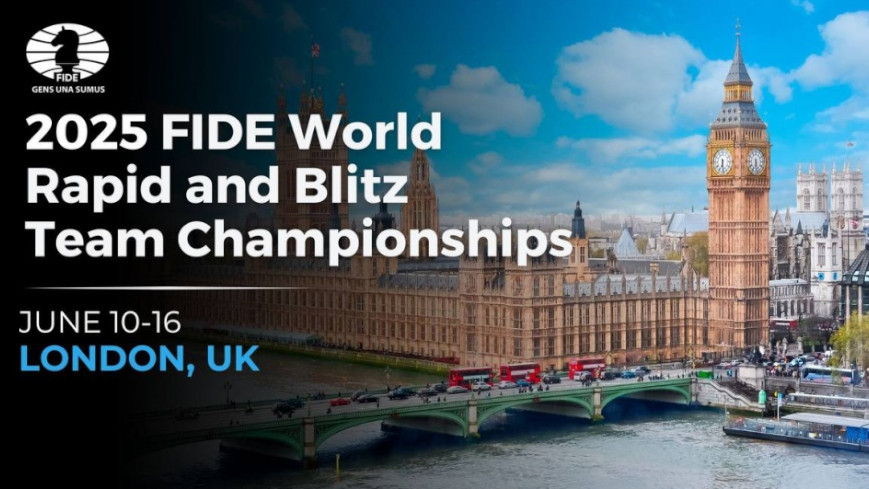
The 2025 FIDE World Rapid and Blitz Team Championships will take place in London, United Kingdom, between June 10 and 16, 2025. With the prize fund amounting to $500,000 (a substantial increase from 2024 edition) the competition is expected to attract world’s top players. Thus, the event is set to deliver an unforgettable week of high-level chess action. The FIDE World Rapid and Blitz Team Championships have quickly became one of the highlights on the chess calendar. Now in its third edition (and second for the blitz format), the event brings together players from around the world. Competing in mixed teams, they create an exciting blend of top-level competition and team camaraderie. Fans can expect to see some of the biggest names in chess battling it out alongside emerging talents and even amateur players, thanks to the event’s inclusive format. The 2023 FIDE World Rapid Team Championship, the very first edition of the event, saw WR Chess Team clinch the title with a dominant performance. In 2024, the rapid title was secured by Al-Ain ACMG UAE, while WR Chess Team, led by Magnus Carlsen, triumphed in the Blitz portion. London has previously hosted major chess events, including the Tech Mahindra Global Chess League 2024, its annual London Chess Classic, and of course the historic 2018 World Chess Championship match between Magnus Carlsen and Fabiano Caruana. The return of a premier FIDE championship to London highlights the city’s growing role in the global chess boom. FIDE CEO Emil Sutovsky commented: “FIDE is proud to bring one of the most exciting events of our Calendar to London. World Rapid Teams is a mix of a top-level chess and fun. We expect the World’s best players to take part – but also the format of the event will allow many English club players to face the biggest stars of the game. The event has a record prize fund, and in addition to awarding the top, we will introduce significant prizes for non-professional clubs and teams. Top FIDE competition comes to London after a long break, and it reflects the ongoing chess boom in England. I am certain, that this event will further boost the public and media attention for our game.” This year, the event is supported by the Scheinberg family, long-term partners of FIDE. Their contributions have elevated top-level chess through events like the FIDE Grand Swiss (2019, 2021, 2023), Women’s Grand Swiss (2021, 2023), the FIDE Candidates Tournament (2022, 2024), and the FIDE Women’s Candidates Tournament 2024. By partnering with FIDE for the 2025 FIDE World Rapid and Blitz Team Championships, the Scheinberg family continues to promote chess worldwide, ensuring this event in London reaches new heights. The tournament regulations will be finalized and published in early February 2025, with more details on team composition and qualifications to follow. FIDE looks forward to welcoming players, teams, and fans from around the world to London for this exciting chess spectacle.
FIDE World R & B Championships 2025 to be Held in Doha, Qatar
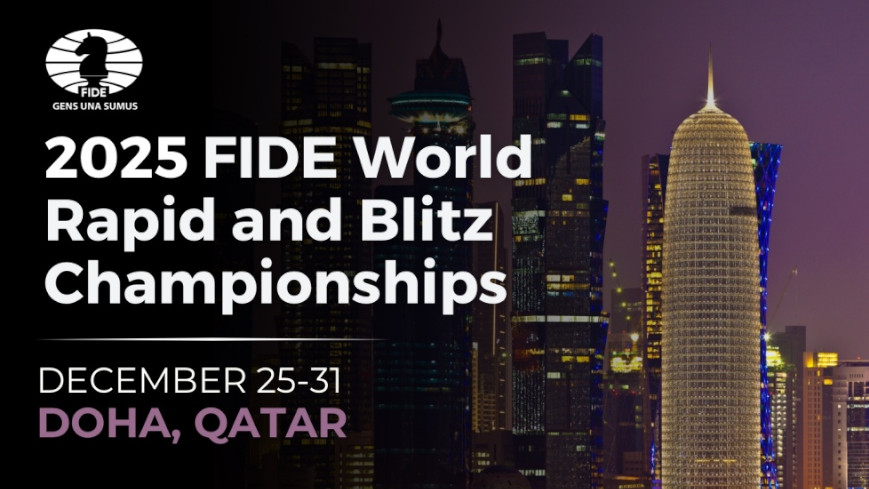
Following the resounding success of the 2024 FIDE World Rapid and Blitz Championships in New York City, FIDE is excited to announce that the 2025 edition of these landmark tournaments will return to Doha, Qatar. The event is scheduled from December 25 to December 31, 2025, with the Rapid Championships taking place from December 26 to 28, followed by the Blitz Championships on December 29 and 30. This marks the second time Qatar will host the FIDE World Rapid and Blitz Championships, having previously done so in 2016. In the Open section, Vassily Ivanchuk clinched the Rapid title, while Sergey Karjakin secured the Blitz title. In the Women’s section, Anna Muzychuk delivered an outstanding performance and achieved victories in both the Women’s Rapid and Blitz categories. The FIDE World Rapid and Blitz Championships are among the most exciting and popular events in the chess calendar, attracting top players and fans worldwide. The faster time controls and dynamic gameplay lead to thrilling and unpredictable matches, captivating audiences and keeping them on the edge of their seats. The 2024 edition in New York City, for instance, drew millions of online viewers, underscoring the event’s global appeal. Qatar’s commitment to chess is further exemplified by its experience in organizing major chess events, most notably the Qatar Masters Open in 2014, 2015, 2023, and 2024. The nation’s dedication to attracting top-tier talent makes it a fitting venue for the upcoming championships. According to the decision of the FIDE Council, rating fees for the 2025 FIDE World Rapid and Blitz Championships as well as all other rated rapid and blitz tournaments held in 2025-2026 are waived for all the participants. FIDE looks forward to collaborating with the Qatar Chess Association to deliver an exceptional event for players and fans worldwide.
Armenian Championship 2025: Hovhannisyan and Gaboyan defend titles
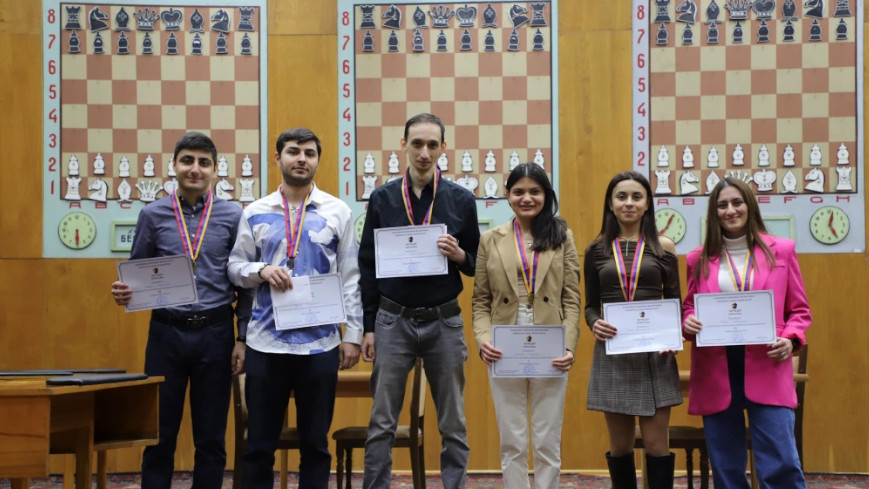
GM Robert Hovhannisyan and WIM Susanna Gaboyan successfully defended their titles, emerging as the 2025 Armenian Champions. Hovhannisyan claimed his third national title, while Gaboyan secured her fourth. The 85th Armenian Championship and the 80th Women’s Armenian Championship took place simultaneously in Yerevan from January 14-22. Traditionally, both events, 10-player round robins with classical time control, were hosted by the Tigran Petrosian Chess House in the Armenian capital. The 85th Armenian Championship missed the top five Armenian players, but still attracted seven grandmasters. The defending champion and top seed Robert Hovhannisyan confirmed his status as a pre-tournament favorite, delivering a very solid performance. Robert took the lead in Round 6 and finished strong with 6.5/9, a full point ahead of IM Artur Davtyan and Sargis Sargsyan who tied for second place. Although the top five Armenian players were absent, the tournament featured a competitive field, including seven grandmasters. Defending champion and top seed Robert Hovhannisyan lived up to expectations, delivering a consistent performance throughout. Hovhannisyan took the lead in Round 6 and finished convincingly with 6.5/9, a full point ahead of his closest competitors. IM Artur Davtyan and FM Sargis Sargsyan tied for second place with 5.5/9, but Davtyan claimed silver on tiebreaks, leaving Sargsyan with the bronze. Notably, Sargsyan overcame a rough start after losing his first two games. 85th Armenian Championship final standings: 1 GM Hovhannisyan, Robert 2626 6½ 2 IM Davtyan, Artur 2458 5½ 3 FM Sargsyan, Sargis 2370 5½ 4 GM Andriasian, Zaven 2554 4½ 5 GM Petrosyan, Manuel 2590 4½ 6 FM Agasarov, Benik 2387 4½ 7 GM Harutyunyan, Tigran 2513 4½ 8 GM Grigoryan, Karen H. 2572 4½ 9 GM Gharibyan, Mamikon 2486 3 10 GM Hayrapetyan, Hovik 2462 2 The 80th Women’s Armenian Championship was a close race between the defending champion WIM Susanna Gaboyan and WFM Anna Khachatryan. Going into the final round a half-point ahead of her main rival, Susanna defeated the lowest rated participant Llia Danielyan and clinched the title with 7/9. Anna also secured a victory in Round 9 game and finished second on 6.5/9. Three players tied for third place, with WFM Marian Avetisyan claiming bronze thanks to a superior Sonneborn Berger tiebreak. 80th Women’s Armenian Championship final standings: 1 WIM Gaboyan, Susanna 2202 7 2 WFM Khachatryan, Anna 2076 6½ 3 WFM Avetisyan, Mariam 2067 6 4 Gasparyan, Milena 1949 6 5 Hayrapetyan, Nvard 2014 6 6 WFM Kobak, Polina 2071 4 7 Danielyan, Lilia 1712 3 8 Harutyunyan, Meline 1919 2½ 9 Arakelyan, Syuzanna 1903 2½ 10 Khachatryan, Mariam 1842 1½ Photos: Armenian Chess Federation Facebook Official website: chessfed.am/en
Tata Steel Masters 2025: Two share the lead after Round 5
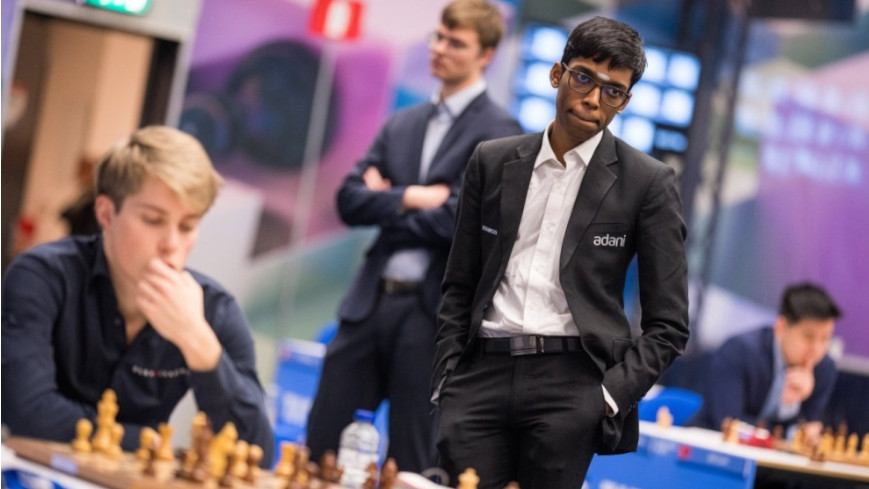
Praggnanandhaa R and Nodirbek Abdusattorov share the lead with 4/5 as the Tata Steel Masters 2025 heads into the rest day. Reigning World Champion Gukesh D and Vladimir Fedoseev notched up crucial victories in Round 5, trailing the leaders by just half a point. Pentala Harikrishna follows in fifth place with 3/5. Round 5 highlights The game between Vladimir Fedoseev and Fabiano Caruana featured a topical line of the Ragozin Defence, in which Black comfortably equalized and transitioned into a minor piece endgame. The position remained balanced until Caruana made a critical error after reaching time control. Instead of the natural 41…Kb6, Fabiano played 41…Bg2?, apparently missing a very strong response 42.e5! After 42…fxe5 43.fxe5 b4 (43…Bxf3?? 44.Nd4+) 44.Nd4 Kc5 45.e6 Kd6 46.axb4 axb4 47.Bxd5! White won a pawn and converted it into a full point twelve moves later. 1-0 The encounter Gukesh D – Vincent Keymer saw very interesting complications in the center right after the opening. As a result, White exerted heavy pressure along the d-file and won a pawn. The German GM could have defended resiliently, but instead he opted to trade most of the pieces liquidating into in a rook + bishop vs. rook + knight endgame. Despite some inaccuracies in conversion, Gukesh eventually forced resignation on move 72. Facing Jorden Van Foreest with the black pieces, Nodirbek Absusattorov drew fire on himself in Caro-Kann Advance Variation and got an inferior but very complicated position. After the Dutchman prematurely pushed his b-pawn on move 17, Black’s king found safety on the queenside and the game was on. White pushed hard and temporarily sacrificed a piece, only to land in a worse position as Abdusattorov seized control over the d-file. Attempting to complicate matters, Jorden sacrificed a pawn on the queenside but overlooked a nice tactical shot. 32…Rxf4! 33.Rxf4 Qxe5! 34.Qa2 Qe3+! 35.Rf2 Bg3! Nodirbek precisely calculated that White had just several checks. Twelve moves later, Van Foreest threw in the towel. 0-1 Tata Steel Masters standings after Round 5 In the Challengers event, home player Erwin L’Ami leads the standings with 4/5, followed closely by his compatriot Benjamin Bok and Thai Dai Van Nguyen (Czech Republic), both on 3.5/5. Tata Steel Challengers standings after Round 5 Photos: Tata Steel Chess, Lennart Ootes Official website: tatasteelchess.com
Chess Championships at 8th CSIT World Sports Games: Registration open
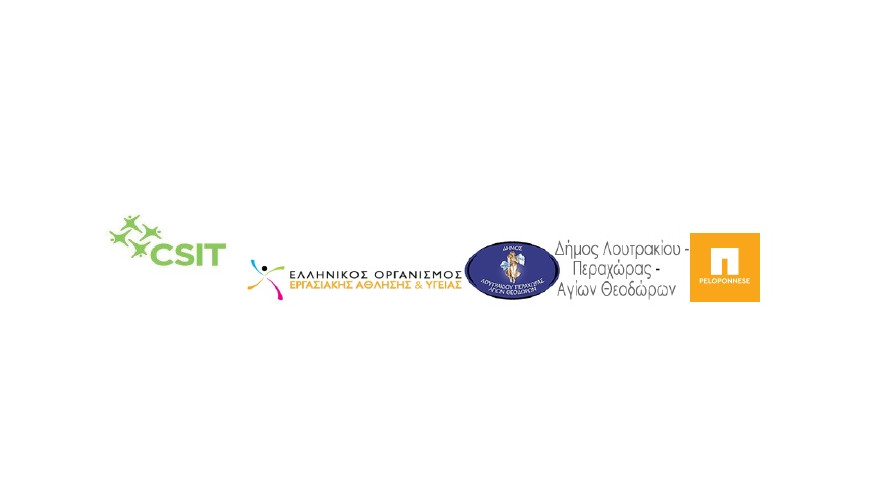
The International Workers and Amateurs in Sports Confederation (CSIT), the Hellenic Organization for Company Sports and Health (HOCSH), the Municipality of Loutraki and the Region of Peloponnese are delighted to invite amateur chess players from all around the world to participate in the Rapid and Blitz Chess Championships of the 8th CSIT World Sports Games (WSG). This exciting event will take place in the picturesque city of Loutraki, overlooking the famous Corinthian Gulf, from June 3 to 8, 2025. The WSG is a major biennial multi-sport event that celebrates not only sports but also cultural exchange, friendship, and shared expertise. It is a unique opportunity to meet people from different countries and backgrounds while enjoying a vibrant atmosphere filled with sports and festivities. The chess program of the festival includes Rapid Team Championship (25 min + 10 sec) and Individual Blitz Championship (5 min + 3 sec). All the participants must have a valid FIDE ID number to compete. The organizers offer three accommodation packages (A, B, and C), detailed in the Invitation Letter. The registration deadlines are January 31 (Preliminary Registration) and March 15 (Final Registration). All registrations and payments shall be done through the Online Registration Platform:https://wsg2025.aicsnetwork.net/Default.aspx Invitation letter, regulations, schedule, packages, contact information (PDF) Official website: https://2025.csit-world-sports-games.com/ About the CSIT World Sport Games (WSG) The WSG are a major multi-sports event held every two years, full of sports, sport for all, cultural exchange, fun and new opportunities. These Games are not for top athletes, but for amateurs from different countries and cultures all over the world. The event blends sport competitions with the festive spirit of the beautiful region of Loutraki and famous Corinthian Gulf. The objectives are to create a worldwide family of sports enthusiasts, build friendships, and promote the exchange of knowledge and expertise within the CSIT multi-sport community and its partners.
WSCIM Highlights: Chess as a catalyst for social change
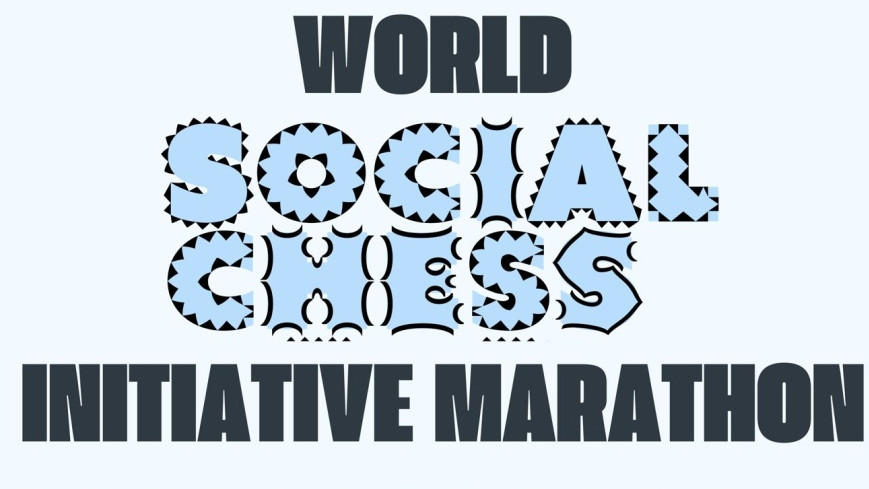
The second session of the World Social Chess Initiatives Marathon brought together chess activists, experts and promoters from across the globe to discuss the benefits of introducing the game to deprived areas and prisons. The participants also discussed the role chess has in helping the elderly cope with challenges of old age. As the first event in the Year of Social Chess, the Chess Initiatives Marathon was organized by the FIDE Social Chess Committee and brought together experts, activists and NGO representatives working on projects where chess is used as a tool for addressing social issues. Following the first part of the World Social Chess Initiatives Marathon on January 19, the afternoon session highlighted three relevant topics: how chess can help inmates, troubled youth and children from deprived areas; how the game can be used to help elderly cope with social and psychological challenges of old age; and the role chess can play in building diplomatic bridges between nations. Reform behind bars: From prisons to deprived areas, how chess helps Transforming lives in Mexican prisons José Manuel Barradas of the Mexican Chess Federation spoke about the implementation of the chess programs in Mexican prisons. Last year’s national championship for prisoners saw participation from over 40 institutions, and Barradas outlined an ambitious plan to introduce chess clubs in prisons, supported by government and private funding. “We need money for boards, pieces, but most important—teachers who can work inside prisons,” he emphasized. The initiative, guided by the FIDE Social Chess Commission, aims to expand across Latin America. Barradas highlighted the personal rewards: “Helping people is satisfying, and everyone should try it at least once.” Nigeria’s Anchor heritage initiative Focusing on western and northern parts of Nigeria, the Anchor Heritage Initiative employs chess to aid inmate rehabilitation. By providing legal aid, welfare, counseling, and rehabilitation programs, the organization works to facilitate inmates’ reintegration into society. One of its standout programs is the 100-day Chess Initiative, which uses the game as a tool for personal development and skill-building among inmates. “Pausing and thinking,” a key chess strategy, has helped individuals like Ayo, a 17-year-old participant, manage anger and impulsivity. Looking ahead, the organization plans to establish Chess Corners in custodial centers and host tournaments. These efforts aim to address Nigeria’s high recidivism rates by equipping inmates with skills for reintegration. Full presentation:https://drive.google.com/drive/folders/14ph3sJtozsx4U6RTKFWW1aRtQmd4ix1R Anchor Heritage – Chess as a Correctional Tool (PDF) Uplifting vulnerable youth in Brazil and Papua New Guinea In Brazil’s Ribeirão Preto region, Alexandre Vergara’s “Viva Chess Classes” are transforming lives in Jardim Zara, a neighborhood plagued by social challenges. Part of the Quebrada Viva project, the initiative uses chess to foster critical thinking and community spirit among children from underprivileged backgrounds. Since its inception in 2021, Quebrada Viva focuses on children and adolescents from low-income and vulnerable backgrounds, utilizing chess as a motivational tool for engagement, education and improvement. “The goal is to help children in these deprived areas build confidence and have a sense of achievement through structured play and learning,” Vergara said. In another part of the world – Stephen Deburu’s Chess Inda Hood project in Port Moresby focuses on reducing anti-social behavior and drug abuse among young people. The program emphasizes discipline, critical thinking, and engaging parents—particularly mothers—to involve their children. “The greatest benefit from this is the stories you hear from people, as testimonies of how chess has changed their lives. Getting them to love the game and to get to know other people gives a sense of progress and achievement, building a positive state of mind,” said Deburu. Full presentation:https://drive.google.com/drive/folders/14ph3sJtozsx4U6RTKFWW1aRtQmd4ix1R Viva Chess Classes (PDF) Enhancing life for the elderly Chess for Connection: Bridging generations in Canada “Chess for Connection” is a Canadian youth-led nonprofit initiative dedicated to addressing the social, emotional, and cognitive challenges faced by seniors. Inspired by the story of Gilbert Bong Perez—a retired doctor and chess Olympian for Canada— the initiative aims to use chess an inclusive and accessible tool that transcends physical ability and age. April Zhong, who presented the project, highlighted the importance it has in today’s social climate, noting that as global populations age, seniors increasingly face cognitive and physical challenges, reduced social connections, and heightened risks of loneliness and isolation. The program offers a variety of tailored activities, ensuring inclusivity and adaptability based on the needs of each senior home and its participants. Activities include chess lessons at an individual or group level, tournaments and events, as well as light-hearted sociable activities such as drinks or discussions. Regular participation of seniors aged 50 to 90, who praise the program for its engaging activities and opportunities to connect with youth. With over 800 volunteer hours logged by 30 young chess players, the program has expanded internationally, establishing a branch in Uganda in collaboration with Makerere Chess Society. Full presentation:https://docs.google.com/presentation/d/1XbyxhX5xFl3ZycTHzVqSP9jB42h26Bps/edit?usp=drive_web&ouid=108323171340070226706&rtpof=true Chess for Connection (PDF) Lifelong learning at Club Athletico Paulistano Cristiana Fiusa Carneiro, a former Brazilian chess champion, legal expert and psychologist, shared her experience organizing chess programs for elderly members of Club Athletico Paulistano in São Paulo. Starting in 2015 with just four participants and one class a week, the program now boasts three weekly classes and 26 regular attendees. Carneiro explained how the classes combine chess instruction with opportunities for socialization and mental stimulation. The classes are spread into four sections – they begin with giving people time to socialise and connect, making them feel more comfortable with the setting. The next step is to solve chess problems, to help stimulate them. Then comes the main point of the lesson – teaching strategy through theoretical lessons, exercise and games. The lesson ends with friendly matches between participants. “Regular sessions provide a sense of security and community, reducing isolation and improving well-being,” she noted. Plans for future expansion include digital tools and collaborations with other senior programs. Full presentation:https://docs.google.com/presentation/d/1ZSkj-t1EgQRanrGDAB6Fho65QeZ1ug3X/edit#slide=id.p5 Chess for Aging Group at Club Athletico Paulistano (PDF) Chess as a tool for diplomacy and peace Lior Aizenberg, founder of Chess4all and Chess4Solidarity in Israel, highlighted the role of
FIDE Statement regarding the “Freestyle Chess” project

With regard to the recent communications from the “Freestyle Chess Players Club” (“FCPC”), FIDE states the following: The International Chess Federation (FIDE) is the only internationally recognized governing body of chess (in particular, by the International Olympic Committee), regulating all official international chess competitions. While we have always remained open to cooperation with private organizations and initiatives across the chess community, FIDE retains its supreme role with respect to the rules, titles, and ratings. FIDE’s status and global responsibilities towards the chess community are distinct and non-negotiable. FIDE does not oppose commercial platforms, projects, or privately managed clubs, such as the FCPC, engaging with players in their own capacity. However, the attempts by FCPC to present their project as a World Championship are in contradiction with the well-established status of FIDE and its authority over world championship titles in all relevant variations of chess – including Chess960/Freestyle chess, as outlined in the FIDE Handbook. Moreover, the line of conduct adopted by FCPC threatens the execution of players’ existing contractual obligations towards FIDE. The steps taken by the FCPC project unavoidably lead to divisions in the chess world – and we remember all too well the unfortunate consequences of a similar split that happened in the not so distant past. Although the formal status of 2025 Freestyle Chess series has yet to be determined, FIDE wants to ensure that all players can plan their schedules for 2025. That is why – as a matter of goodwill and to provide sufficient comfort to the players for the immediate future – FIDE took the decision to accommodate the 2025 Freestyle Chess series in the calendar and to refrain from invoking relevant legal clauses in previously signed contracts concerning players’ participation in 2025 Freestyle events. Nevertheless, FIDE retains all its legal rights related to the World Championship title and will be ready to challenge organizers and initiators of any series that decide to brand themselves as a “World Championship” without the approval of FIDE. We are open to dialogue, and looking forward to reaching a mutually acceptable agreement, provided that the governing role and its well established authority of FIDE over the World Championships is respected by potential partners. Should such an agreement not be reached, FIDE demands that the Freestyle series does not carry the status of a “World Championship”. FIDE will not hesitate to use all legal means against those who violate its rights – be it initiators, organizers and/or investors of the project. As the 2025-2026 World Championship cycle is underway, all qualified players are expected to sign an additional contract, which will include a clause indicating that participation in any alternative world chess championships in any variation of chess not approved by FIDE (except for the Freestyle tour in 2025) would lead to their withdrawal from the two consecutive FIDE World Championship cycles. As a part of the contracts, FIDE commits to running the cycle events at the highest level with substantially increased prize funds – the dates and locations of those are published in FIDE Calendar.
FIDE Grand Swiss 2025 to be held in Samarkand, Uzbekistan
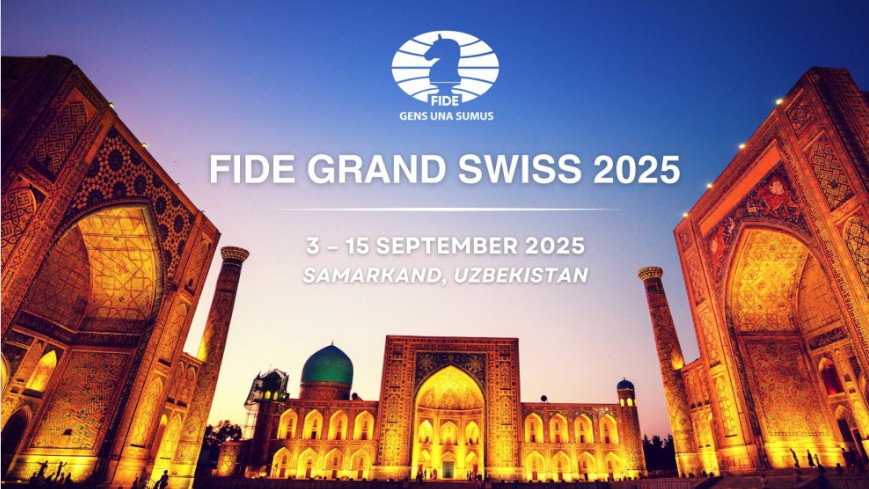
FIDE is excited to announce that the 2025 edition of the FIDE Grand Swiss and Women’s Grand Swiss will take place in Samarkand, Uzbekistan, from September 3 to 15, 2025. This will be the first time the prestigious event is hosted in Uzbekistan, a country with a rich chess heritage and rapidly growing influence in the global chess community. From their gold-medal performance at the 2022 Chess Olympiad to a bronze medal at the 2024 Olympiad, as well as hosting world-class events such as the 2022 Women’s Candidates Tournament in Khiva, the 2023 Rapid and Blitz World Championships, and the upcoming 2026 Chess Olympiad in Tashkent, Uzbekistan has firmly established itself as a chess powerhouse and a major hub for the game. The FIDE Grand Swiss is one of the most significant events in the chess calendar, providing players with a direct pathway to the Candidates Tournament. The top two finishers in the Grand Swiss will earn spots in the 2026 Candidates Tournament, while the top two players in the Women’s Grand Swiss will qualify for the 2026 Women’s Candidates Tournament. In addition to its importance as a qualifier, the event will feature an increased prize fund—boosted by at least 30%. The Grand Swiss has quickly become a highly anticipated event since its inception. The first tournament, held in 2019 on the Isle of Man, saw Wang Hao emerge victorious with an impressive 8/11 score. The 2021 edition, moved to Riga due to COVID-19 restrictions, was won by Alireza Firouzja. The 2023 edition returned to the Isle of Man and was claimed by Vidit Gujrathi. This year will also mark the third edition of the Women’s Grand Swiss. The first tournament in Riga was won by Lei Tingjie, while Vaishali Rameshbabu triumphed in 2023. FIDE President Arkady Dvorkovich expressed his excitement about the event: “Uzbekistan’s commitment to chess development is exemplary, and Samarkand provides the perfect setting for this prestigious event. The FIDE Grand Swiss and Women’s Grand Swiss have become flagship events in the FIDE Calendar, and we are proud to partner with Uzbekistan once again to deliver another world-class tournament.” Further details, including regulations, will be released by the end of February. In the meantime, be sure to mark your calendars for September 2025, as this promises to be an unforgettable chess showdown.
Highlights from World Social Chess Initiatives Marathon

The Year of Social Chess launched with its first event – an online conference shedding light on innovative ways chess is driving social inclusion and empowering communities How can a simple board game transform lives, unite communities, and inspire change? On the morning of January 19, the FIDE Social Chess Commission launched its first event to celebrate 2025 as the Year of Social Chess. The World Social Chess Initiatives Marathon gathered coaches, scientists and NGO representatives who use chess in social inclusion projects to discuss their work and challenges. Spanning multiple countries and case examples, the participants of the conference shared their experiences, highlighting different perspectives on the role chess can play in social inclusion. The conference opened with a question to the participants – What does social chess mean to you? In a list of words proposed as answers to this question, two stood out as the most selected among participants: inclusivity and impact. This sentiment was also highlighted in the opening remarks by FIDE President Arkady Dvorkovich, who highlighted the importance his team has given to promoting social initiatives that bring people together. “Chess is more than a sport – it is a powerful social and educational tool. That is why FIDE takes it as its responsibility not only to promote chess competitions but to also make the game more available and accessible to everyone, everywhere. With this in mind, we proudly declare 2025 as The Year of Social Chess during which FIDE will organize projects and launch initiatives aimed at connecting individuals, organizations and institutions across the globe to use the power of chess for community building and personal growth,” Dvorkovich said. Deputy Chair of the FIDE Management Board, Dana Reizniece, who has actively participated in social inclusion chess events in previous years, highlighted some of the biggest success stories of the projects so far: from the case of Héctor Guifarro, whose life was changed thanks to learning chess while serving a seven-year prison sentence, to the 3,000 refugee children trained by FIDE though the Chess for Freedom project. Reizniece also announced a new ambitious plan “to increase the number of kids engaged with chess in education from 25 to 50 million, and we will work hard to deliver that,” setting it as one of the key goals for the initiatives launched in the Year of Social Chess, which will continue in the years to come. “Be it yours or ours – every move counts,” said Reizniece, emphasizing the importance of every single effort made when it comes to social inclusion. FIDE Social Commission Chair Andre Vögtlin outlined that this Marathon is “the opportunity to start a process that will go beyond 2025”. “It is a start [of a process] to reunite all of us and bring all the social chess projects together and line the foundation for a social chess journey which will last for years to come”. Vögtlin noted that the goal for 2025 is to establish a global network of social chess enthusiasts, educators and players and create initiatives which will have an impact beyond 2025, engaging national federations, sponsors and local communities. The Social Commission also aims to conduct studies that showcase the impact of chess in different social communities, creating a valuable database for an evidence-based approach to using the game to empower different groups. These sentiments were echoed by Dr M. R. Das – the Indian Oil Corporation Executive Director and ambassador of Social Chess for India – who said that the low cost associated with playing chess, makes the game easily accessible everywhere in the world. He also noted India’s role in the social chess projects, including in schools and prisons. Key presentations from the first session of the Social Chess Marathon conference: Chess and the parallels of everyday life Ákos Vizsolyi, a mental health professional and chess coach, shared his experiences on the role chess can play in everyday life, including on the company level, helping executives and employees make decisions and better coordinate their work. Noting the complex dynamics which exist in multi-level organizations, whether formal or informal, Vizsolyi explained that chess can play a role in the development and strengthening of competencies, the practice of self-reflection, decision-making processes and strategic vision. Taking responsibility for the consequences of the moves in chess, the reality on the chess board reflects the reality of decisions in work and everyday life, thus providing a useful paradigm to test and experience potential scenarios. “The activities of chess players and decision makers are very similar in a long list of aspects – objectives and goal setting, conceiving of strategy, planning, visibility level and control level,” said Vizsolyi highlighting the multi-level connections chess has with everyday life. Chess against failure Frédéric Zaborski, a retired French teacher, founded the NGO “Échecs contre échec” (“Chess against failure”) in 2016, running in France, Cambodia, Laos, Brazil and Mexico. The focus of the organization is to use chess as an educational tool to combat failure and promote personal development, primarily among students and marginalized communities. The organization aims to provide schools with chess equipment, sending club members or local players to educational institutions to introduce students to chess. Drawing on his experiences in chess education, Zaborski emphasized the need for a clear agreed commitment and action plan with the schools on introducing chess to children, in order for the projects to thrive. “As a former teacher, each student has their own way of understanding things. A teacher therefore must use different modes of approach,” Zaborski said. “The main mistake is that the presentation/discovery of the chess board is often made too quickly, discouraging many students. Before being introduced to the rules, the student must understand the board – the geometry, space. That is not easy for all. Chess teachers must spend more time on this initial step,” he noted. OLIMPIA Chess Academia (Spain) and Chess2all (Portugal) Jose Francisco Suarez Roa a psychologist and chess player from Spain spoke about the initiatives OLIMPIA Chess Academia has been organizing on the

